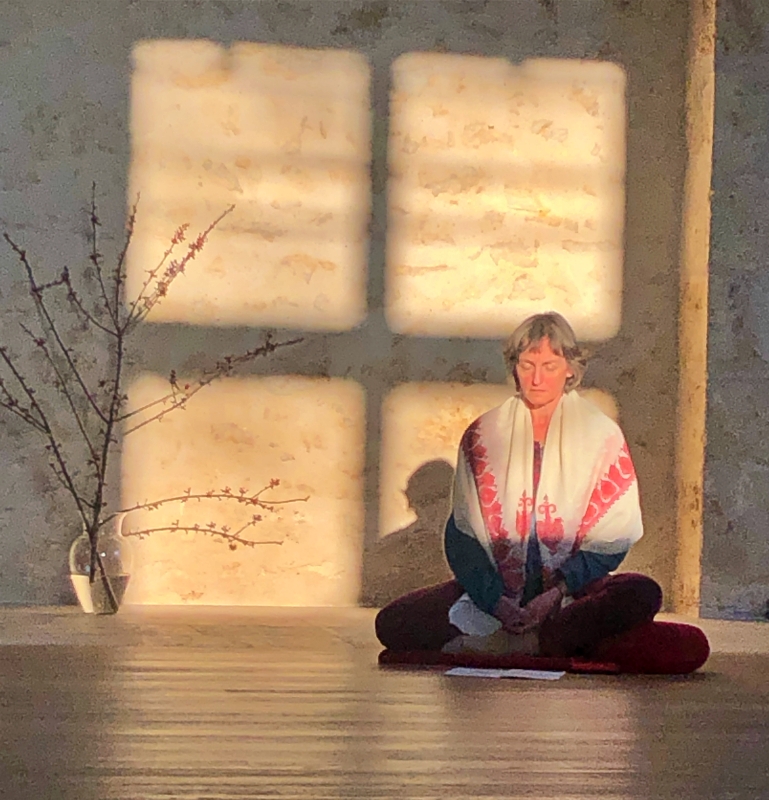How to meditate and structure a retreat day
Discernment and Journaling
“I desire mercy not sacrifice.”
Matthew 9:13
.
Retreat is not an escape from yourself but a deeper meeting with yourself.
At the start of your retreat at home, you might like to journal on some of the following questions:
- What are my reasons for being on this retreat?
- How does this connect to where I am at in my life?
- What am I hoping for?
In your journal you might want to also makesome space to reflect on other questions and/or themes that might be hiding just under the surface. Journaling at the beginning of a retreat marks a reference point that you can refer back to as you discern the work of the Spirit in your life.
Be gentle and realistic in structuring your time each day. Remember that making a retreat – less doing, more being – is a time where we choose to consent to be made whole.
How to Meditate
Sit down. Sit still with your back straight. Close your eyes lightly. Then interiorly, silently begin to recite a single word – a mantra. We recommend the ancient Christian prayer-word “Maranatha”. Say it as four equal syllables Ma-ra-na-tha. Breathe normally and give full attention to the word as you say it, silently, gently, faithfully and – above all – simply.
The essence of meditation is simplicity. Stay with the same word during the whole meditation and in each meditation session each day. Don’t visualise it but listen to the word as you say it. Let go of all thoughts (even good thoughts), images and other words. Don’t fight your distractions. Instead, let them go by saying your mantra. Say it:
- Faithfully – keep returning to it when you get distracted
- Gently – don’t use force, be light
- Attentively – take the attention off everything else
Meditate twice a day, morning and evening, for between 20 and 30 minutes. If you are on retreat it will be easier to meditate midday as well. As with any discipline it takes time to develop this practice. If you are a beginner to meditation, once you get going, you will probably discover how good it is to meditate in community and may want to join a meditation group (click here for meditation groups in your time zone).

What you are doing is, as it were, being launched into the prayer of Jesus. It is very difficult to talk about this without using images, but the prayer of Jesus is just like a rushing torrent flowing between Jesus and the Father. What we have to do is to plunge ourselves into that and be swept along by it. It is a torrent of love, not a torrent of words or images. And that is why we have to learn to be wholly silent. The mantra is simply bringing us deeper and deeper into that silence.
– John Main, In the Beginning
We encourage you to visit WCCM.org where you will find many other resources to help you with your meditation practice. www.wccm.org
Silence, Solitude and Simplicity
The mothers and fathers of the desert are quoted as saying “stay in your cell and your cell will teach you everything.” While creating you’re your monastic retreat cell, you will want to give some thought to how much solitude you would like during your retreat and how silent your time of retreat will be. This will depend on your circumstances.
If you have a room or place where you can be during the retreat, you could use it as your monastic cell. If you live with others, you may want to explain and negotiate your time of solitude, silence and practice. You may also like to include contemplative walks in nature.
…when you have to return to your sitting, day by day, and learn to sit in silence, solitude and openness, then you soon discover that this calls for more and more love on your part, not just enthusiasm.
John Main
Decide on a rhythm for your retreat day
With the above in mind, create a rhythm to your retreat days. This can be achieved by balancing the times of meditation, some reading, some physical activity and being in nature if possible. We recommend that you meditate at least 2 or 3 times a day during your retreat. In fact, if you are not used to doing so yet, this retreat may be a time when you establish your second meditation session of the day.
For a physical activity, take up something you can enjoy. Some examples to consider are yoga, tai chi, cleaning at home, gardening, going for a walk, a run or a bike ride.
We recommend that you steer clear of your usual habits of work at home, especially if you spend long hours at the computer, phone, house work. It would be advisable to turn your mobile off and put an unavailable auto response message for emails. If you are compulsive about some habits, say cleaning, going to the gym, using your mobile phone you may want to vary your activity in order to create space to listen to the Spirit in your life. If you dive each day into your habitual rhythm of doing you will miss the point.
Try to limit your online connection to the necessary minimum – we want to help you be “at home,” safe and centered as the Psalmist says “Be still and know that I am God.”
Creating a space to meditate in

Choose on an area in your where you would be happy to sit to meditate, read and reflect. For instance, this could be your attic or in front your favorite window.
You need to site conformtably with your ack straight, whether you’ve chosen a cushion, a kneeler or a chair. Decide on how to make your meditation space just right for you, with a candle, an icon or a vase a flowers or simply a bare table.
Suggested Schedule
You may decide to be in silence all day or for part of the day. Try a half day in silence from waking to lunch and then back into silence after the last meditation of the day.
- 6:30 meditation
- 7:20 meditation and morning prayer (see below on structuring prayer/Lectio)
- breakfast
- time for reflection, being in nature, sleep, work/exercise
- 10:00 talk and or Q&A
- time for reflection, being in nature, sleep, work/exercise
- 12:15 mediation and midday prayer
- lunch
- time for reflection, being in nature, sleep, work exercise
- 15:30 talk and or Q&A
- 18:00 meditation and evening prayer
- dinner
- talk and or quiet reading
- meditation
- sleep
